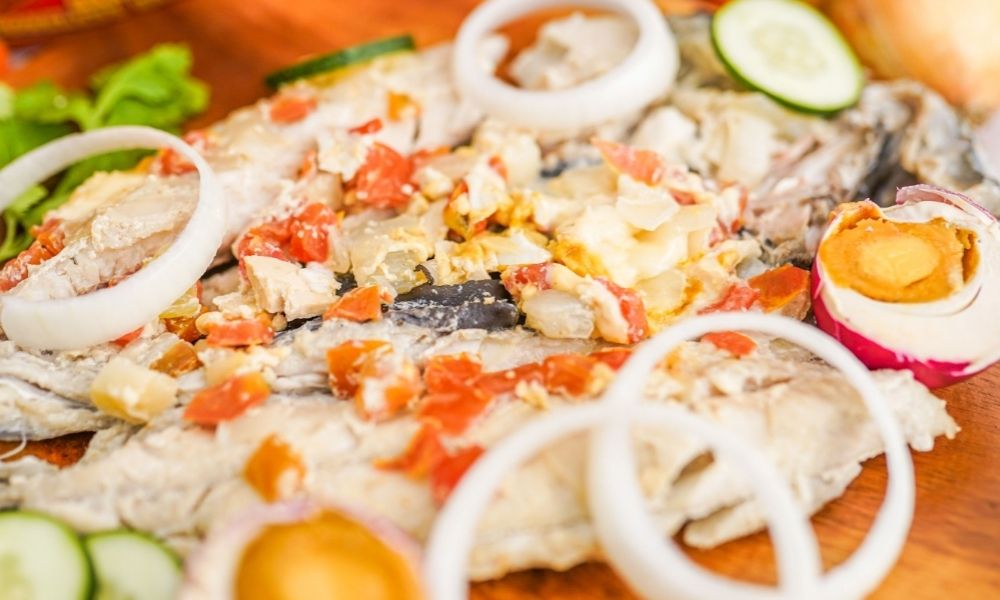Health Benefits of Boneless Bangus: Why You Should Include It in Your Diet

Bangus (milkfish) has built its own popularity in the Philippines not only for its title of being the national fish of the country but also because of its timeless taste and versatility in preparation. It can be made into a stew, mousse, steak, or simply fried, making it a quick pick for your groceries!
Another one of its unique forms is baked boneless bangus which is a contemporary twist on the traditional boneless bangus. It’s simple yet new, refreshing, and flavorful — what’s even better is that it’s relatively healthier compared to other cooking preparations.
 Being one of the most popularly cultured fishes in the country, fresh bangus sold by local vendor Papaping’s is sourced from Dagupan which is known as the Bangus Capital of the World for producing the “tastiest milkfish.” Papaping’s baked boneless bangus is stuffed with tomatoes, onions, and spices, making it juicy with the aroma of delicious and nutritious food!
Being one of the most popularly cultured fishes in the country, fresh bangus sold by local vendor Papaping’s is sourced from Dagupan which is known as the Bangus Capital of the World for producing the “tastiest milkfish.” Papaping’s baked boneless bangus is stuffed with tomatoes, onions, and spices, making it juicy with the aroma of delicious and nutritious food!
Benefits of Boneless Bangus
The benefits of boneless bangus go beyond hassle-free food consumption caused by deboning. When it’s baked, it retains more of its nutritional value compared to when it’s fried or soaked in soup bases flavored with artificial additives or preservatives.
Here are some common questions about the health benefits of bangus:
Is Bangus Good for Diet?
The natural components of bangus include vitamins B, B6, B3 (niacin), and pantothenic acid. According to LIVESTRONG.com, All four of these vitamins are water-soluble B-complex vitamins that play vital roles in metabolism, central nervous system function, skin health, DNA, hormones, and red blood cell formation.
3 oz of milkfish roughly contains 162 calories. Its nutrient breakdown is 0% carbs, 42% fat, and 58% protein. Although it does contain a high percentage of fat, 60% of the fat is heart-healthy monounsaturated fat, like omega-3 fatty acids.
Taking up the majority of its nutrient content, it makes a good and healthy source of protein which helps increase energy, build strength and muscle growth, balance blood sugar, and help ward off illnesses and infections by creating antibodies.
Is Bangus High in Uric Acid?
You may have gone through the internet to get an answer on this one, and you most likely have found contradicting information with others suggesting that bangus is high in uric acid while others imply that it is not. Bangus generally has moderate levels of uric acid in comparison to other types of fish, which explains the confusion. Therefore, one’s uric acid levels are mostly dependent on the amount of bangus consumed. If consumed moderately or better, temperately, it shouldn’t be a cause of concern to those suffering from gout.
Is Bangus Good for the Heart?
Two of the nutritional components in bangus that are significantly helpful for heart health are vitamin B3 (niacin) and omega-3 fatty acids. According to a source reviewed by MD Jabeen Begum, Vitamin B3 or Niacin helps to effectively manage cholesterol levels, slow the progression of certain types of heart disease, and even help prevent memory loss and dementia.
On the other hand, omega-3 fatty acids keep the heart healthy by lowering blood pressure and reducing the risk of an irregular heartbeat. It also lowers the risk of heart attack and has even been recommended by the American Heart Association (AHA) to reduce cardiovascular events, like heart attack or stroke, in people who already have cardiovascular disease (CVD).
Is Bangus Good for Eyesight?
The presence of omega-3 fatty acids is not only beneficial for the heart but also for eyesight as it helps prevent dry eyes and decrease the risk of eyesight loss. It also contains vitamin A which is known for maintaining eye health and preventing eye disorders.
Is Bangus Good for Fatty Liver?
As ironic as it sounds, oily and fatty fish like bangus can help combat a fatty liver. This is also due to its omega-3 fatty acid content that helps lower fat levels in the liver and reduce inflammation.
According to a meta-analysis, omega-3 fatty acid have been found to optimize liver fat, liver enzyme levels, and blood lipid levels in patients with Nonalcoholic Fatty Liver Disease (NAFLD), supporting the idea that it can help slow down the progress of NAFLD.
Is Bangus High in Protein?
Fishes are generally known to be high in protein which makes them one of the best options for those looking for a healthy yet strength-inducing meal. Bangus, specifically, contains an average of 20 grams of protein per 3 oz. This is especially helpful for fitness goals as it helps reduce appetite and hunger levels while increasing muscle mass. It also helps boost metabolism and increase fat burning!
The rich nutritional value of baked boneless bangus makes it an ideal addition to anyone’s diet— may it be for health enthusiasts, muscle builders, or those cautious against illnesses. Processed through baking, it’s guaranteed to retain its natural nutrients that are otherwise washed out as they undergo more unhealthy cooking processes. Its boneless feature also makes it a quick and convenient meal!
Read more about the effects of omega-3 fatty acid in Nonalcoholic Fatty Liver Disease: https://www.ncbi.nlm.nih.gov/pmc/articles/PMC5019889/


